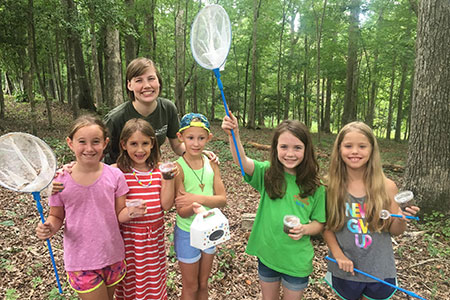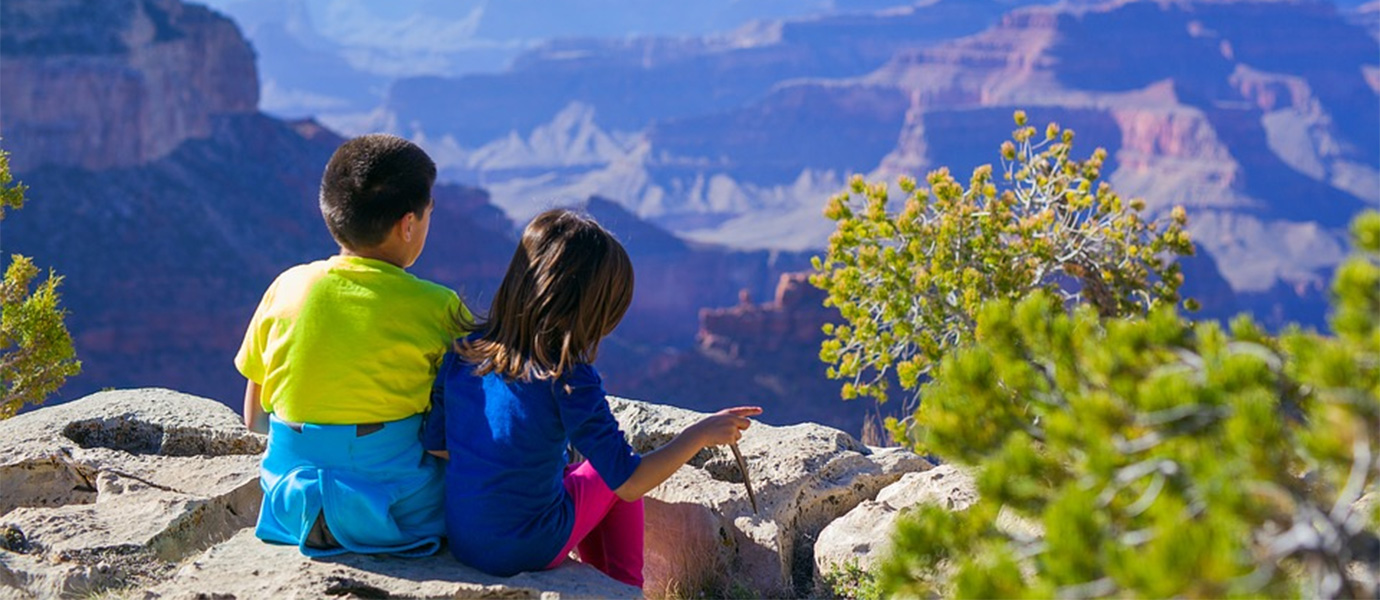
School
Students will learn about deer, birds, and insects with the help of the White Deer Park Nature Center’s live animals, taxidermy, and other specimens. Outside, they’ll look for signs of these animals and learn how their adaptations help them in the wild. Other programs allow students to test Lake Benson’s water quality, collect insects for examination, conduct soil experiments, and learn bird-watching skills. Programs must be booked at least three weeks ahead. The picnic shelter on-site can also be booked for school group lunches.
supports classroom learning in:
Environmental Studies.
topics covered:
Biology, living environment, water ecology, wetlands, ecosystems, animal science, conservation, habitats, soil, animal adaptations, birds, taxidermy, scientific method.
contact info
Name: Katie Spencer, Outdoor Education and Parks Manager
Phone: 919-773-4435 or 919-661-6892
Email: [email protected]
INFO
ABOUT
White Deer Park Nature Center
Nestled at the edge of the forest and wetlands, White Deer Park Nature Center is an ideal setting for introducing your group to local wildlife, habitats, and environmental science. The center is located in the 96-acre White Deer Park, which is home to owls, turtles, beavers, and of course, white-tailed deer. In the nature center, groups will have the chance to meet resident animals Poppy the corn snake, yellow-bellied sliders Sheldon and Sally, and Naveen the tree frog. Students, scouts, homeschoolers, and campers will be immersed in nature as they walk the trails, participate in educational programs, and see specimens on view at the center. The site’s Nature Center Classroom and Learning Deck can be rented for your group when available.
contact info
Hrs: Daily Sunrise-Sunset.
HELPFUL LESSON PLAN(S)
Prepared by FieldTripDirectory.com
Nature Exploration Lesson Plan
FUN FACTS
One single tree can provide the oxygen required for two human beings and over 8,000 sheets of paper. Trees can also clean the soil and air by absorbing harmful pollutants. So what have you done for a tree lately? Nature centers and state parks provide a hands-on environment to discover facts about native plants and animals, as well as ways to preserve these natural resources.
View Lesson Plan>>
Scouts
Scout groups can work on Nature, Hiking, and other badge requirements on field trips to White Deer Park Nature Center. Educational programs aim to teach scouts about native birds, animal survival, the parts of a tree, the role of insects in the ecosystem, and much more. Activities include hiking along the park’s trails, collecting insects, watching birds with binoculars, conducting experiments with soil, and others. White Deer Park can also help with arranging evening programs and nighttime hikes for your scout troop.
supports scout badges in:
Environmental Science.
topics covered:
Nature, biology, water ecology, wetlands, ecosystems, animal science, conservation, habitats, animal adaptations, insect study, bird study, soil, taxidermy, scientific method, hiking.
contact info
Name: Katie Spencer, Outdoor Education and Parks Manager
Phone: 919-773-4435 or 919-661-6892
Email: [email protected]
INFO
ABOUT
White Deer Park Nature Center
Nestled at the edge of the forest and wetlands, White Deer Park Nature Center is an ideal setting for introducing your group to local wildlife, habitats, and environmental science. The center is located in the 96-acre White Deer Park, which is home to owls, turtles, beavers, and of course, white-tailed deer. In the nature center, groups will have the chance to meet resident animals Poppy the corn snake, yellow-bellied sliders Sheldon and Sally, and Naveen the tree frog. Students, scouts, homeschoolers, and campers will be immersed in nature as they walk the trails, participate in educational programs, and see specimens on view at the center. The site’s Nature Center Classroom and Learning Deck can be rented for your group when available.
contact info
Hrs: Daily Sunrise-Sunset.
HELPFUL LESSON PLAN(S)
Prepared by FieldTripDirectory.com
Nature Exploration Lesson Plan
FUN FACTS
One single tree can provide the oxygen required for two human beings and over 8,000 sheets of paper. Trees can also clean the soil and air by absorbing harmful pollutants. So what have you done for a tree lately? Nature centers and state parks provide a hands-on environment to discover facts about native plants and animals, as well as ways to preserve these natural resources.
View Lesson Plan>>
Camp
Summer camp groups will enjoy various nature themed activities while visiting the White Deer Nature Center. Through games, fun experiments, and more, campers will learn about a variety of nature-related topics such as oceanography and pollination. Camp groups can also play on the contemporary playground area, hike the trails, slide down the 22-foot slide, and more. Reserve an on-site picnic area in advance to have a summer camp group lunch.
contact info
Name: Katie Spencer, Outdoor Education and Parks Manager
Phone: 919-773-4435 or 919-661-6892
Email: [email protected]
INFO
ABOUT
White Deer Park Nature Center
Nestled at the edge of the forest and wetlands, White Deer Park Nature Center is an ideal setting for introducing your group to local wildlife, habitats, and environmental science. The center is located in the 96-acre White Deer Park, which is home to owls, turtles, beavers, and of course, white-tailed deer. In the nature center, groups will have the chance to meet resident animals Poppy the corn snake, yellow-bellied sliders Sheldon and Sally, and Naveen the tree frog. Students, scouts, homeschoolers, and campers will be immersed in nature as they walk the trails, participate in educational programs, and see specimens on view at the center. The site’s Nature Center Classroom and Learning Deck can be rented for your group when available.
contact info
Hrs: Daily Sunrise-Sunset.
HELPFUL LESSON PLAN(S)
Prepared by FieldTripDirectory.com
Nature Exploration Lesson Plan
FUN FACTS
One single tree can provide the oxygen required for two human beings and over 8,000 sheets of paper. Trees can also clean the soil and air by absorbing harmful pollutants. So what have you done for a tree lately? Nature centers and state parks provide a hands-on environment to discover facts about native plants and animals, as well as ways to preserve these natural resources.
View Lesson Plan>>
Homeschool
Homeschoolers will learn about deer, insects, and birds with the help of the White Deer Park Nature Center’s live animals, taxidermy, and various specimens. Field trips utilize outdoor areas around the park where homeschoolers can look for signs of these animals and learn how their adaptations help them in the wild. Other programs focus on water pollution, bugs, soil quality, water pollution, and more. Activities include learning to watch birds with binoculars, testing water from Lake Benson, owl pellet dissection, and many others. Programs must be reserved at least three weeks in advance. The picnic shelter on-site can also be reserved to accommodate a homeschool group lunch.
topics covered:
Environmental studies, biology, water ecology, wetlands, ecosystems, animal science, conservation, habitats, soil, animal adaptations, birds, taxidermy, scientific method.
contact info
Name: Katie Spencer, Outdoor Education and Parks Manager
Phone: 919-773-4435 or 919-661-6892
Email: [email protected]
INFO
ABOUT
White Deer Park Nature Center
Nestled at the edge of the forest and wetlands, White Deer Park Nature Center is an ideal setting for introducing your group to local wildlife, habitats, and environmental science. The center is located in the 96-acre White Deer Park, which is home to owls, turtles, beavers, and of course, white-tailed deer. In the nature center, groups will have the chance to meet resident animals Poppy the corn snake, yellow-bellied sliders Sheldon and Sally, and Naveen the tree frog. Students, scouts, homeschoolers, and campers will be immersed in nature as they walk the trails, participate in educational programs, and see specimens on view at the center. The site’s Nature Center Classroom and Learning Deck can be rented for your group when available.
contact info
Hrs: Daily Sunrise-Sunset.
HELPFUL LESSON PLAN(S)
Prepared by FieldTripDirectory.com
Nature Exploration Lesson Plan
FUN FACTS
One single tree can provide the oxygen required for two human beings and over 8,000 sheets of paper. Trees can also clean the soil and air by absorbing harmful pollutants. So what have you done for a tree lately? Nature centers and state parks provide a hands-on environment to discover facts about native plants and animals, as well as ways to preserve these natural resources.
View Lesson Plan>>
